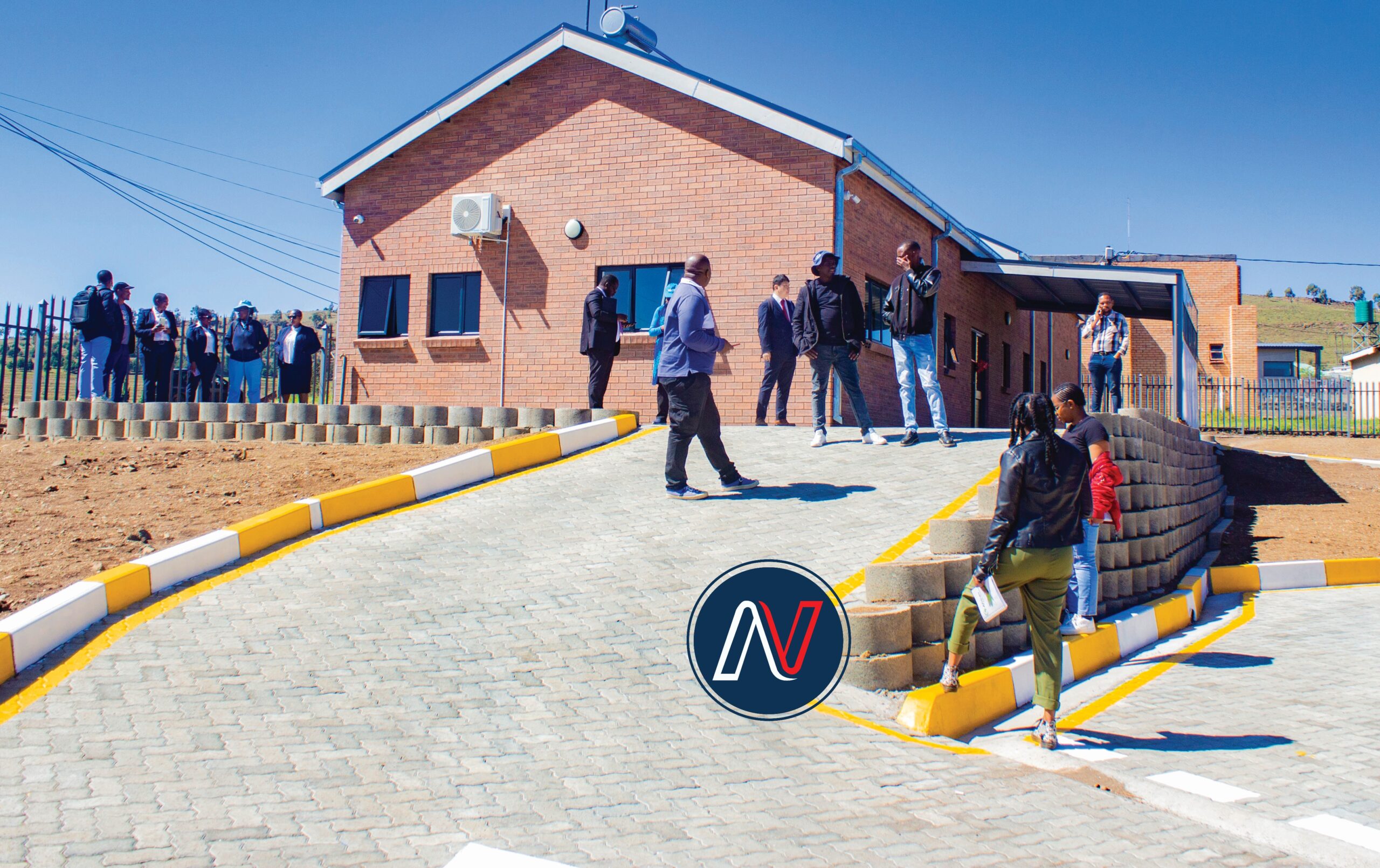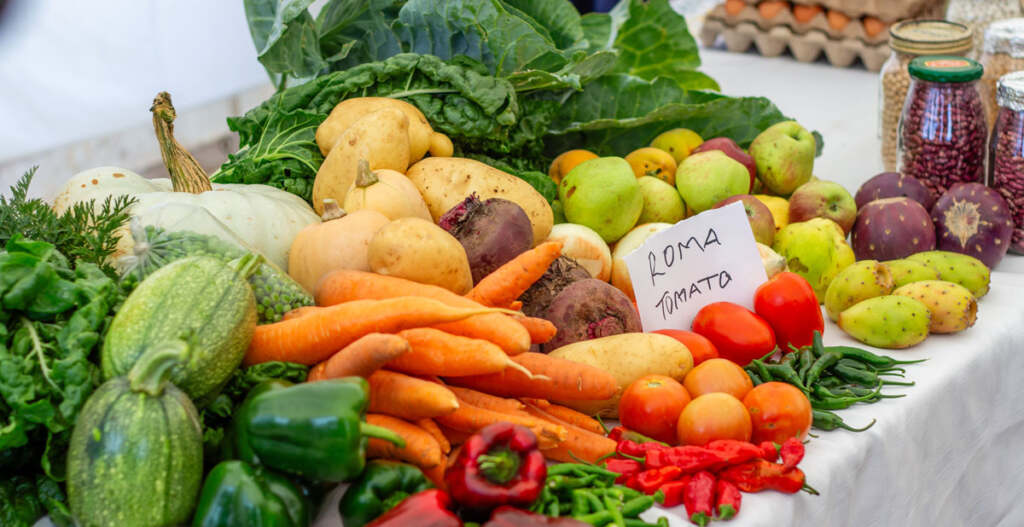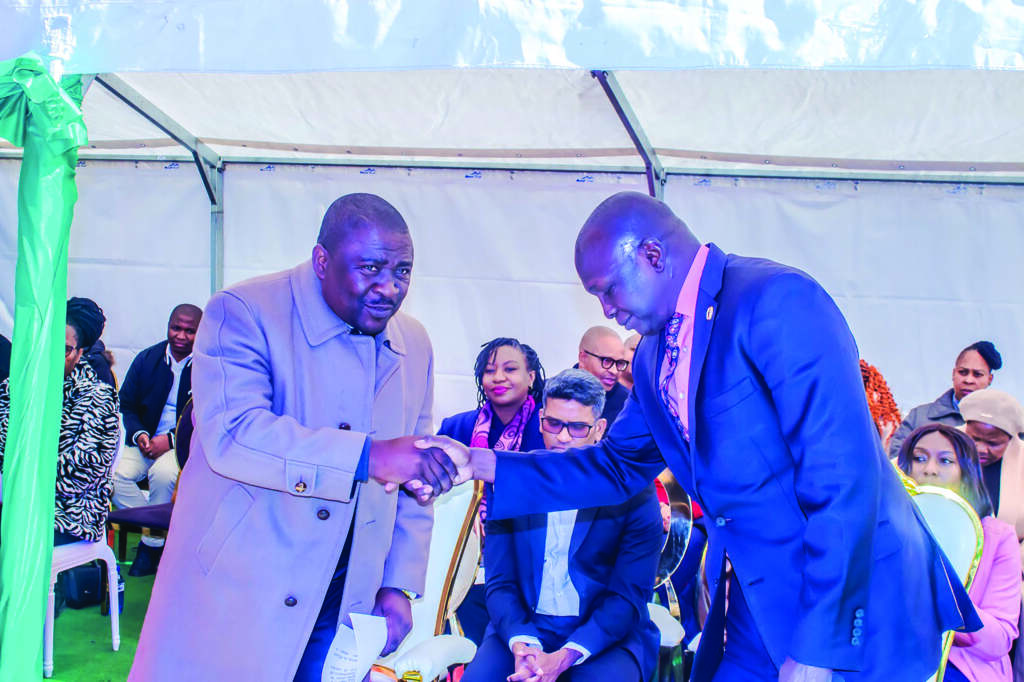In a significant boost to child health and national immunisation capacity, Prime Minister Samuel Ntsokoane Matekane has officially opened the newly constructed Thaba-Tseka District Vaccine Store, which will serve an estimated 63,696 children across the district.
Implemented by UNICEF Lesotho and the Ministry of Health, with generous support from the Government of Japan under the Japan Emergency Grant Aid, the facility marks a critical step toward ensuring equitable access to life-saving vaccines, particularly for children in Lesotho’s remote, mountainous regions.
Built to World Health Organisation (WHO) standards, the state-of-the-art store is designed to strengthen Lesotho’s vaccine storage and distribution capabilities. Its opening aligns with Japan’s broader “Last Mile” strategy, which aims to ensure vaccines reach even the most vulnerable populations across Africa.

The facility boasts sophisticated infrastructure, including an automated electric and cooling system, specialised insulated flooring designed to prevent germ buildup and water damage, and a robust energy backup system powered by solar and generator technology.
Dr. Joseph Mashale, the District Medical Officer (DMO) for Thaba-Tseka, expressed immense pride and gratitude for the new facility.
“This store directly addresses our long-standing challenge of properly storing vaccines and cooler boxes,” he said.
Dr. Mashale explained that the district’s 22 health facilities, including the hospital, clinics, and health posts, are spread across six community councils, making accessibility difficult. In the past, inadequate storage conditions sometimes led to vaccine spoilage and losses for the government.
“With this new, quality-controlled store, those challenges are now history,” he affirmed. He emphasised that the facility’s enhanced capacity will support routine immunisation, campaigns, and outreach programmes, significantly strengthening the district’s ability to reach every child.
Highlighting the importance of timely vaccination, Dr. Mashale added: “Vaccines play a crucial role in children’s lives because their bodies are not yet fully developed and their immune systems still need boosters to fight diseases. It is our duty to ensure every child enjoys their right to access vaccines.”
The facility includes four specialised refrigerators that maintain temperatures between 15°C and 25°C, and two units calibrated for the standard 2°C to 8°C range, ensuring optimal vaccine preservation.
Speaking on behalf of the Government of Japan, Mr. Takuya Januma, Second Secretary at the Embassy of Japan, outlined the evolution of Japan’s support. He explained that the initial plan, developed in 2019 during the COVID-19 pandemic, aimed to quickly establish prefabricated vaccine stores in all ten districts to enable a rapid cold-chain response.
However, as the pandemic evolved and following consultations with the Ministry of Health, the strategy was refined to focus on sustainable, high-quality infrastructure.
Januma San further highlighted Japan’s broader commitment to Lesotho’s development, citing support for hydropower projects at Katse Dam and the construction of primary school buildings, each valued at approximately one billion Japanese yen.
In addition to the Thaba-Tseka facility, the Government of Japan also supplied large, high-quality refrigerators to the other nine district health centres, ensuring that vaccine stocks across the country are maintained at optimal temperatures.
Bob Muchabaiwa, Deputy Representative for UNICEF Lesotho, reiterated UNICEF’s unwavering commitment to supporting the Government of Lesotho in advancing child health.
“As UNICEF, we have a vision to ensure that every child has access to immunisation services from birth and across the life course,” he said.
He explained that the newly inaugurated Thaba-Tseka District Vaccine Store represents a significant milestone in decentralising vaccine access, as it eliminates the need for health workers to travel to Maseru for essential immunisation supplies.
Muchabaiwa emphasised that this initiative forms part of UNICEF’s broader commitment to ensuring every child in Lesotho can live a healthy life. While the Thaba-Tseka facility is the only one constructed “from scratch” and regarded as “state-of-the-art,” UNICEF continues to work closely with the government to strengthen the entire district cold chain network.
Reflecting on UNICEF’s 30-year partnership with Lesotho, he praised the “tremendous progress” achieved in improving immunisation coverage over the past decade. However, he acknowledged that reaching the “last mile,” ensuring that even the most remote and deprived children are vaccinated, remains an ongoing challenge.
Muchabaiwa commended the Government of Lesotho, the Prime Minister, and his cabinet for their “significant political will” and steadfast support for child health initiatives, describing the opening as “a day of celebration” and a testament to their commitment to improving the well-being of the Basotho people.
Minister of Health, Selibe Mochoboroane, announced that the Thaba-Tseka facility is now the sixth district vaccine store to be established, following those in Maseru, Berea, Leribe, Botha-Bothe, and Mokhotlong.
“We are only left with Mafeteng, Mohale’s Hoek, Quthing, and Qacha’s Nek,” he said.
The Minister explained that the national strategy aims to ensure every district has its own vaccine store to facilitate routine immunisation and streamline the distribution of vaccines to health facilities.
“In the past, we struggled and often delivered vaccines to districts just a day before campaigns,” he noted. “Now, vaccines are distributed well in advance, meaning there will be no delays in reaching our beneficiaries.”
‘Mamamello Holomo, Member of Parliament (MP) for Thaba-Tseka, expressed deep gratitude on behalf of her constituents. She recalled the district’s previous challenges with inadequate storage at Paray Hospital, which often forced them to order fewer vaccines than needed and caused significant delays in restocking from Maseru.
“With this new facility, we can now order whatever quantity we need and maintain the highest standards of cold chain quality,” she said.
Holomo concluded by underscoring that health is the cornerstone of development, stating: “When we speak of national development and of our people, we must first speak of healthy people.”
The Thaba-Tseka vaccine store is part of Lesotho’s broader efforts to sustain high immunisation coverage, supported by international partners such as Gavi, the Vaccine Alliance.
According to 2023 immunisation data, Lesotho has achieved strong national coverage but still faces some gaps:
- DTP3 Coverage: 87 percent
- DTP1 Coverage: 92 percent
- Measles-Containing Vaccine (MCV1): 90 percent
- Dropout Rate (DTP1–DTP3): Five percent
- Zero-dose Children (those who have not received DTP1): 4,262
- DTP3 Coverage in the 20 percent of Districts with Lowest Coverage: 77 percent
Summary
- Implemented by UNICEF Lesotho and the Ministry of Health, with generous support from the Government of Japan under the Japan Emergency Grant Aid, the facility marks a critical step toward ensuring equitable access to life-saving vaccines, particularly for children in Lesotho’s remote, mountainous regions.
- In addition to the Thaba-Tseka facility, the Government of Japan also supplied large, high-quality refrigerators to the other nine district health centres, ensuring that vaccine stocks across the country are maintained at optimal temperatures.
- He explained that the newly inaugurated Thaba-Tseka District Vaccine Store represents a significant milestone in decentralising vaccine access, as it eliminates the need for health workers to travel to Maseru for essential immunisation supplies.

Ntsoaki Motaung is an award-winning health journalist from Lesotho, specializing in community health stories with a focus on sexual and reproductive health and rights, as well as HIV. She has contributed to platforms like “Be in the KNOW,” highlighting issues such as the exclusion of people with disabilities from HIV prevention efforts in Lesotho.
In addition to her journalism, Ntsoaki serves as the Country Coordinator for the Regional Media Action Plan Support Network (REMAPSEN). She is also a 2023 CPHIA Journalism Fellow.









